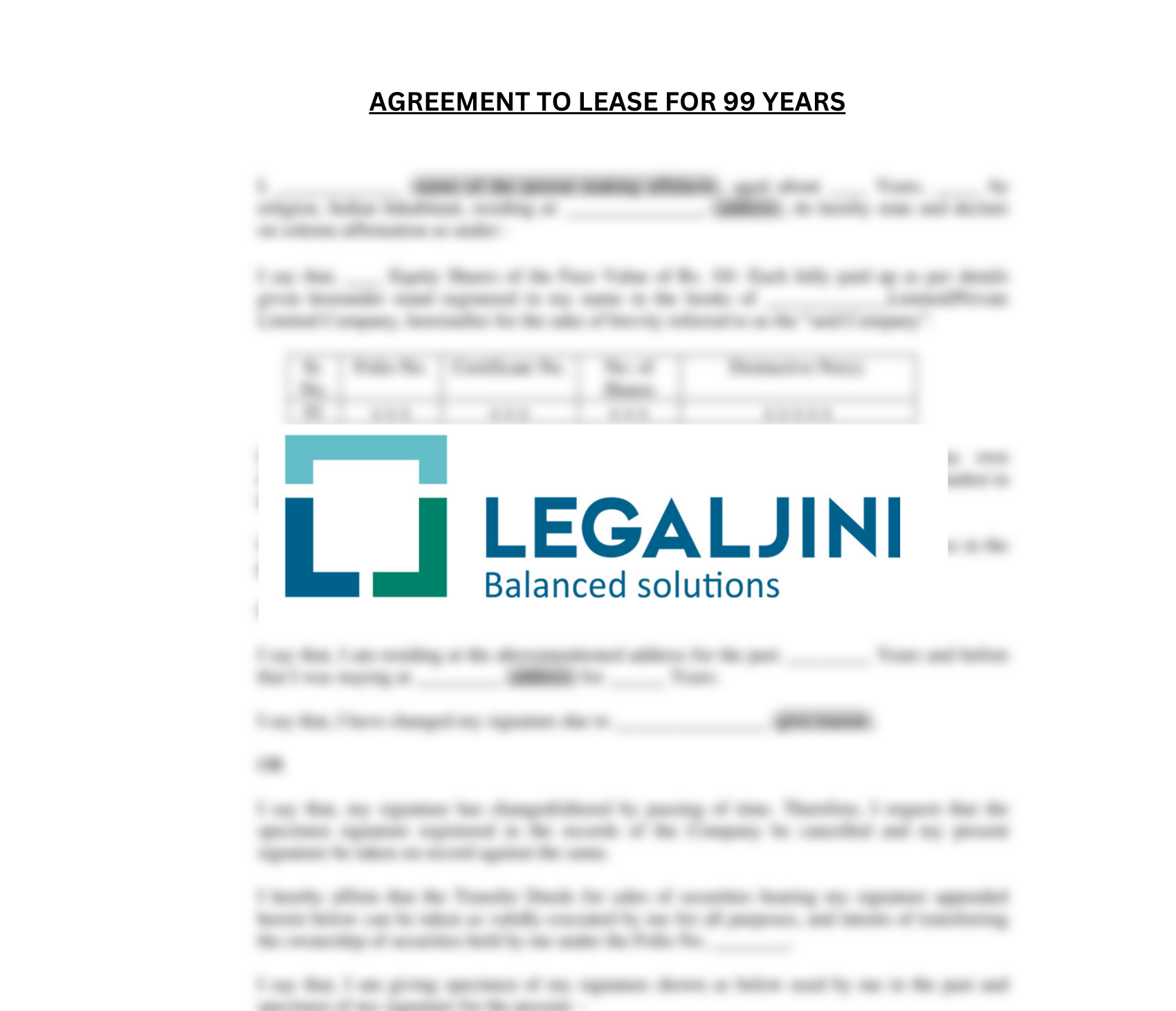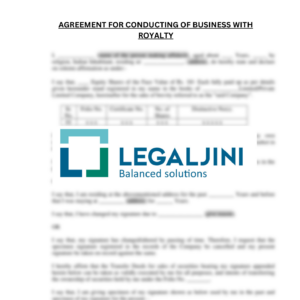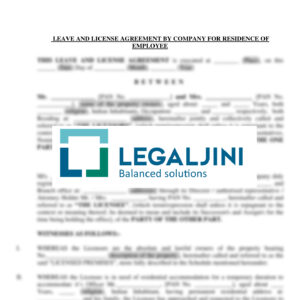Secure a long-term property arrangement with our Agreement To Lease For 99 Years. This document ensures detailed lease terms, fair rent structures, clear lease duration, and establishes termination clauses, constructing a cooperative and legally sound agreement.
Lease Agreement Templates
Protect the obligations and rights of the tenant and landlord with our simple lease agreement template. At LegalJini, we offer long-term lease agreement forms to secure your rental process.
Everything On The Commercial Lease Agreement
What Is A Commercial Lease Agreement?
An instrument and contract between the owner (“Lessor”) of immovable property (“Property”) for lease and the entity/individual (“Lessee”) wishing to lease (acquire possession of) the Property for business purposes is known as a commercial lease agreement, or “Agreement.” The commercial lease agreement outlines the mutually agreed-upon terms and conditions that bind the parties, and under which the tenant may occupy the property, including the rent amount, duration, and responsibilities of each party.
In the commercial rental/lease agreement, the Lessor often drafts rental lease agreements, causing bias for the Lessee’s interests and protection. The lessee is advised to read the terms and conditions of the contract before it is executed. Also, Lessee needs to understand the meaning of each phrase and provision. To protect their interests and clearly understand the terms and conditions stated in the Agreement, the Lessee should speak with real estate attorneys and advocates. In this way, they can enjoy possession of the Property without hindrance for the duration of the Lease Agreement.
What Is The Purpose Of A Commercial Lease Agreement?
The primary purpose of a commercial lease agreement is to safeguard the interests of both the landlord and the tenant by establishing a clear and legally binding framework that defines their rights, responsibilities, and obligations. It is a critical tool in fostering a secure and stable rental- environment, ensuring that both parties get equal property rights.
- For the landlord, the commercial lease agreement assures a steady income stream by specifying the rental amount, payment schedule, and consequences of late payments. It also protects the property owner by outlining the conditions under which the tenant may use the premises, thereby minimizing the risk of property damage or misuse.
- For the tenant, this agreement guarantees a secure space to conduct business operations without the fear of sudden eviction or unexpected changes in terms. By clearly defining the permitted use of the property, the lease agreement allows the tenant to plan and invest in their business with confidence.
A commercial lease agreement helps prevent disputes. It covers essential aspects such as rent, property use, maintenance responsibilities, and termination conditions. For any disagreements, the agreement serves as a reference point, making it easier to resolve conflicts in a fair and legally sound manner.
What Are The Types Of Commercial Lease Agreements?
For commercial lease agreements, there are 6 different types. Here’s a breakdown of the most common types:
- Net Lease Or N-Lease
A Net Lease (N-Lease) is a basic lease type where the tenant pays the base rent and, in addition, a portion of the property taxes. This arrangement allows the landlord to pass some of the financial obligations onto the tenant, making it an attractive option for property owners.
- Double Net Lease Or NN-Lease
In a Double Net Lease (NN-Lease), the tenant is responsible for paying the base rent, property taxes, and insurance premiums. This type of lease reduces the landlord’s overhead by shifting some of the property-related costs to the tenant.
- Triple Net Lease Or NNN-Lease
A Triple Net Lease (NNN-Lease) is one of the most popular forms of commercial property lease agreements. In this arrangement, the tenant takes on the base rent, property taxes, insurance premiums, and maintenance costs.
- Absolute Triple Net Lease
An Absolute Triple Net Lease is a more stringent version of the NNN lease, where the tenant assumes all responsibilities, including structural repairs and any unforeseen expenses related to the property. This type of lease is used in long-term contracts, such as a 99-year lease agreement, where the tenant is essentially treated as the property owner.
- Gross Lease
In a Gross Lease, the tenant pays a fixed rental amount, while the landlord covers all property-related expenses such as taxes, insurance, and maintenance. This type of lease is often favored by tenants who prefer predictable costs without worrying about additional expenses.
- Percentage Lease
A Percentage Lease is commonly used in retail spaces, where the tenant pays a base rent plus a percentage of their gross sales. This arrangement benefits landlords by aligning their earnings with the tenant’s success.
What Laws Are Applied To The Commercial Property Lease Agreement?
The following laws are often relevant to the implementation and continuation of the Agreement:
- The 1872 Indian Contract Act
- 1882’s Transfer of Property Act
- The Act of Registration, 1908
- The 1899 Indian Stamp Act
- 1996’s Arbitration and Conciliation Act
- Other related laws about emerging issues or topics
When Do You Need A Commercial Lease Agreement In India?
In India, a commercial lease agreement is important for long terms, such as a 99-year lease.
- Securing Long-Term Tenancy: Ensuring the tenant has a stable business location for an extended period.
- Avoiding Legal Disputes: Clearly outline the rights and responsibilities of both parties to prevent misunderstandings.
- Complying with Local Laws: Meeting legal requirements and regulations specific to commercial properties in India.
Get Your Lease Agreement Template!
What Are The Limitations Of The Commercial Lease Agreement?
While an office lease agreement provides security and clarity, it also has its limitations that both landlords and tenants should be aware of:
- Limited Flexibility: Once a commercial lease agreement is signed, the tenant may find it difficult to make changes to the property without the landlord’s permission. Any alterations, expansions, or subleasing typically require formal consent from the landlord, limiting the tenant’s flexibility in utilizing the property.
- Long-Term Financial Commitment: A commercial lease agreement often involves a long-term financial commitment. Tenants are obligated to pay rent even if business conditions change, making it financially strenuous for companies experiencing downturns.
- Potential Legal Disputes: Despite the clarity provided by the lease agreement, disagreements can still arise over rent increases, maintenance responsibilities, or lease terminations. If not properly addressed in the agreement, these issues could lead to lengthy and costly legal disputes.
- Restrictions on Property Use: Landlords often impose restrictions on how the leased property can be used, which may limit the tenant’s business operations. The tenant may be restricted from making certain improvements or using the premises for purposes not explicitly stated in the agreement.
Why Is an Agreement to Lease Important?
An Agreement to Lease is a preliminary document that outlines the intention of both the landlord and the tenant to enter into a formal lease agreement. It is a critical step in the leasing process for the following reasons:
- Legal Protection: An agreement to lease provides legal protection to both parties. It outlines the essential terms of the lease, such as rent, duration, and responsibilities, and ensures that both parties are committed before entering into a formal contract.
- Secures the Property: For tenants, signing an agreement to lease can secure the property for a certain period, giving them time to finalize business operations or financing without the fear of losing the premises.
- Clarifies Expectations: It helps clarify any expectations or requirements from both sides, allowing any disputes or misunderstandings to be resolved early on before the formal lease is signed.
Commercial Lease Agreement Template
A Commercial Lease Agreement Template is a ready-made legal document that simplifies the process of leasing business property. It establishes a solid framework by clearly defining the terms and conditions under which the property will be rented, including rent, duration, and maintenance responsibilities. With a Commercial Lease Agreement Template, both landlords and tenants can avoid misunderstandings and legal complications, ensuring a fair and transparent lease process.
Get Started With LegalJini!
LegalJini offers expertly crafted commercial lease agreement templates that cater to various business needs and can be used as a secured gateway for a 99-year lease. Whether you’re looking for an office lease agreement template, a commercial property lease agreement template, or a simple lease agreement template, our expert-curated templates are designed to provide clarity, security, and ease of use both for the lessor and lessee.
FAQ!




